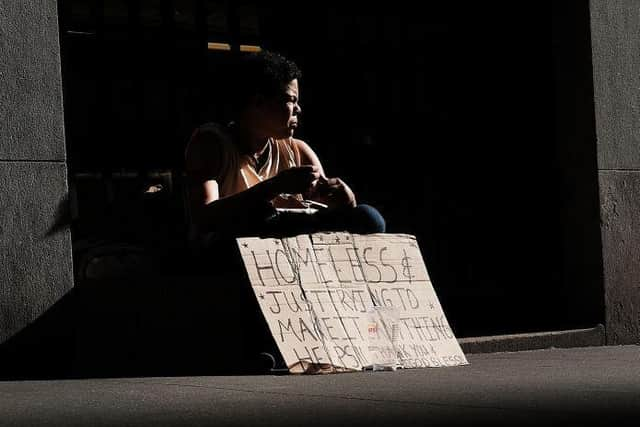Northampton homeless SHOULD have got emergency overnight shelter twice this week as criteria is changed
and live on Freeview channel 276
Homeless people in Northampton should have been given emergency shelter on two freezing cold nights this week, the authorities have admitted.
The criteria for activating the severe weather emergency protocol (SWEP) has been temporarily changed in response to criticism for the lack of intervention.
Advertisement
Hide AdAdvertisement
Hide AdRough sleepers will now be offered accommodation if temperatures are forecast to drop below 0°C for at least two hours between 9pm and 9am.


Single Homelessness Forum chair Rev Sue Faulkner said: “We are all working with commitment and care to meet the needs of rough sleepers and others in inadequate housing.
"We review what we are doing constantly to make the best offer we can to homeless people in line with Covid-19 guidelines."
The previous criteria for SWEP were three consecutive nights of temperatures below freezing or during exceptionally severe weather.
Advertisement
Hide AdAdvertisement
Hide AdNorthampton Borough Council, after discussions with Northampton Hope Centre and NAASH, decided not to activate it this week because the Met Office forecasts had been higher than the actual overnight temperatures.
More than 1,900 people have signed a petition started by homelessness charity Project 16:15 a week ago calling for the protocol to be put in place.
While an anonymous Northampton borough and county councillor told the charity in an email posted on its Facebook page: "It's inhumane to leave people out there in this weather.
"The PDSA (People's Dispensary for Sick Animals) say to take your dogs in as it's too cold for them but unfortunately we won't bring our fellow human beings, who are homeless, in during these low temperatures.
Advertisement
Hide AdAdvertisement
Hide Ad"I, and I'm sure many councillors, are embarrassed and ashamed by this inaction."
Meanwhile the Hope Centre had asked the forum to make SWEP's activation criteria more flexible and thanked the community for showing support for the town's rough sleepers.
The homelessness forum has decided to change the protocol temporarily until its next meeting in January.
Even without SWEP, the street outreach team has continued to encourage rough sleepers to move into the emergency and supported housing that operates all-year-round throughout this period of cold weather.
Advertisement
Hide AdAdvertisement
Hide AdIn a statement, the forum criticised those who have not offered to help with SWEP which has made it difficult to decide what is 'exceptionally severe weather'.
Ms Faulkner said: “I would strongly urge all members of the forum, but especially the faith and community groups, to do everything they can to provide the human resources that are needed to ensure that SWEP can operate effectively and the emergency shelter can open when it is needed and remain COVID-safe.”
The organisation also addressed the misinformation circulating on social media about the number of people who are currently sleeping rough in Northampton.
Last month’s annual 'rough sleeper count' found nine people ‘bedded down’ but did not include another five people found sleeping rough on sites that were not safe to visit on the night.
Advertisement
Hide AdAdvertisement
Hide AdThe coronavirus pandemic has also had an impact as the government forced councils to find shelter for everyone who was homeless or living in dormitory-style accommodation.
Since March 27, more than 170 people have spent at least one night in the emergency accommodation and, by the end of this week, 135 of these will have been helped to move on into settled housing.
Another 73 people who were at risk of sleeping rough or did not want to move into emergency housing have also been helped to move into settled housing.
Ms Faulker added: "Constant attacks on social media, some quite hostile and aggressive, do not do anything to advance the cause of homeless people and undermine and hurt people working tirelessly to improve their care.
“Although some people remain on the streets, the complex reasons for this are being addressed and attempts continue to be made to point them in the direction of the help and support required."